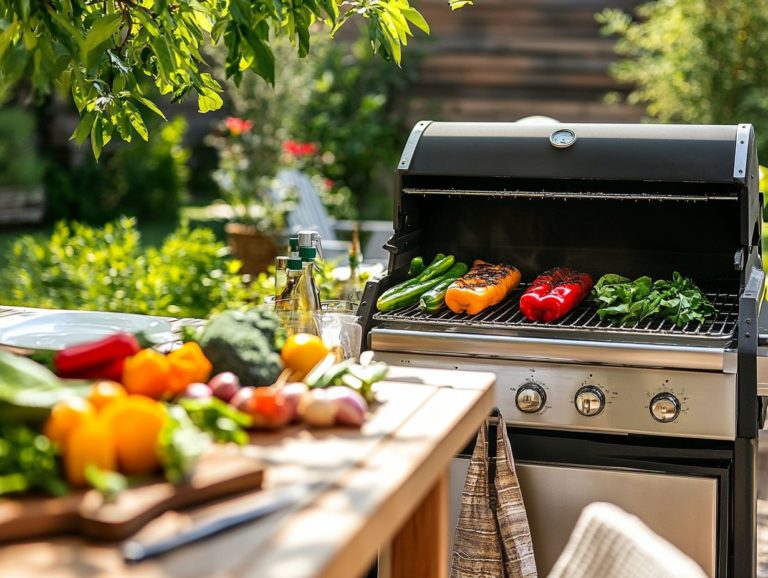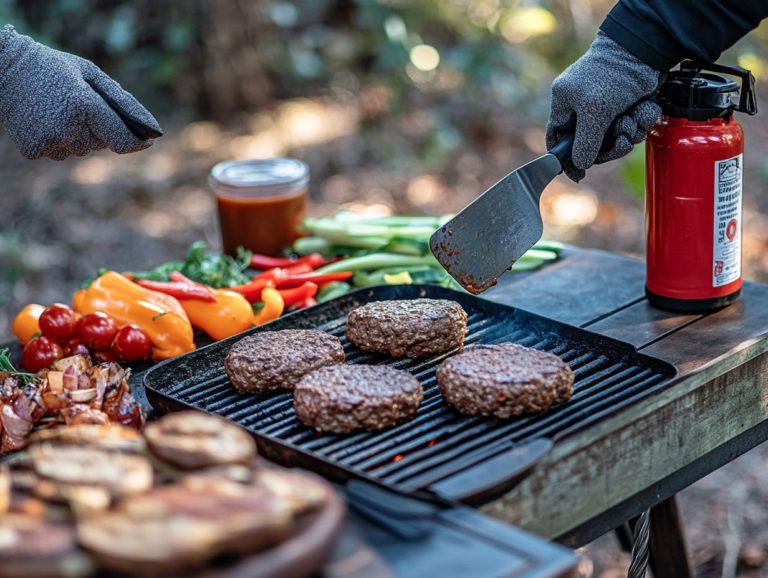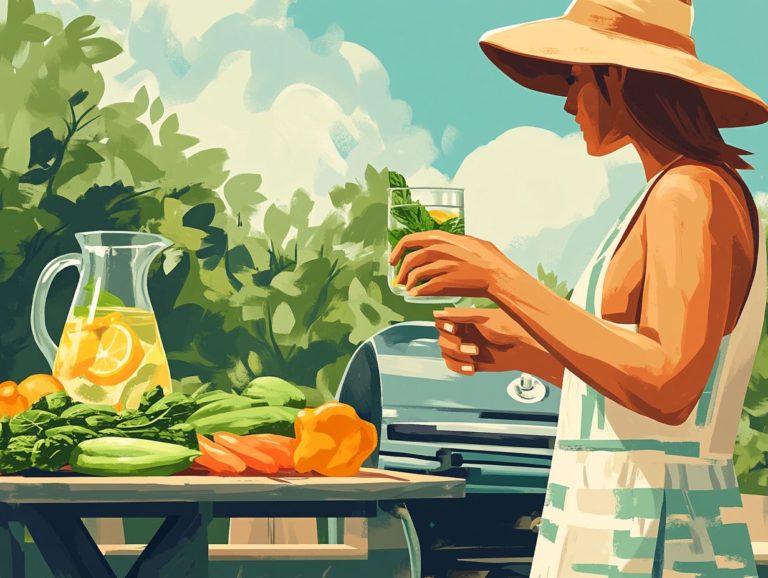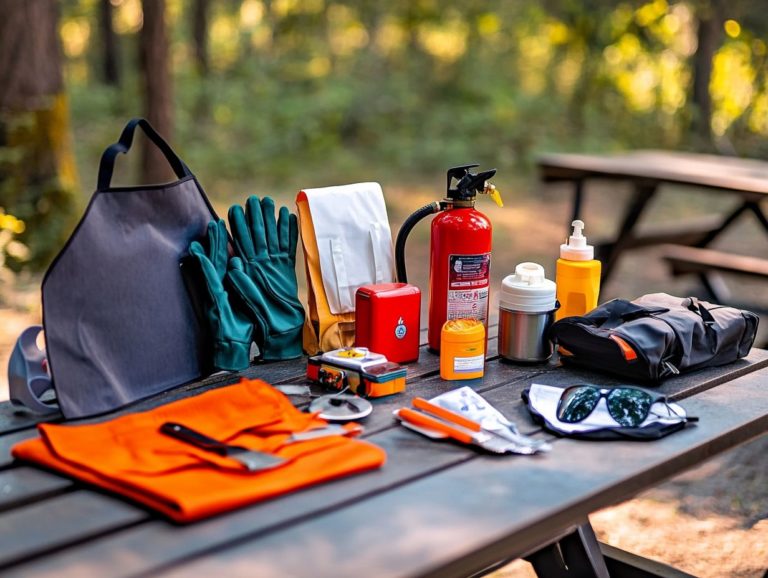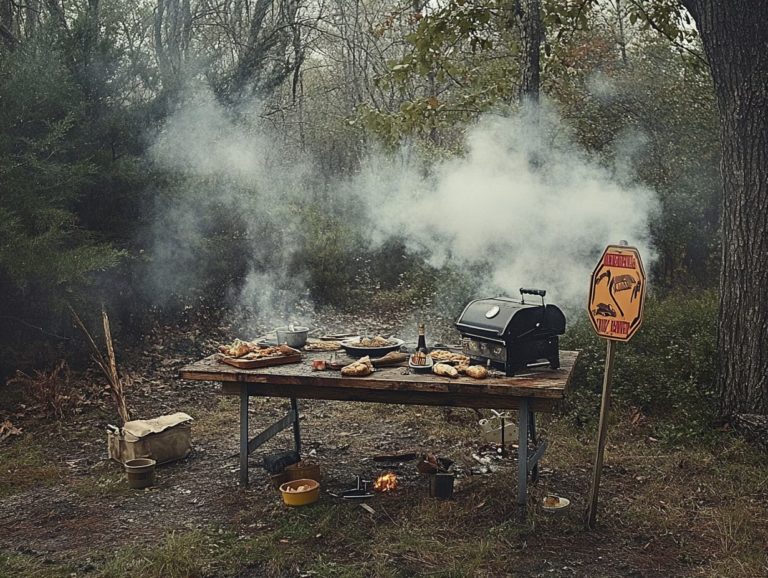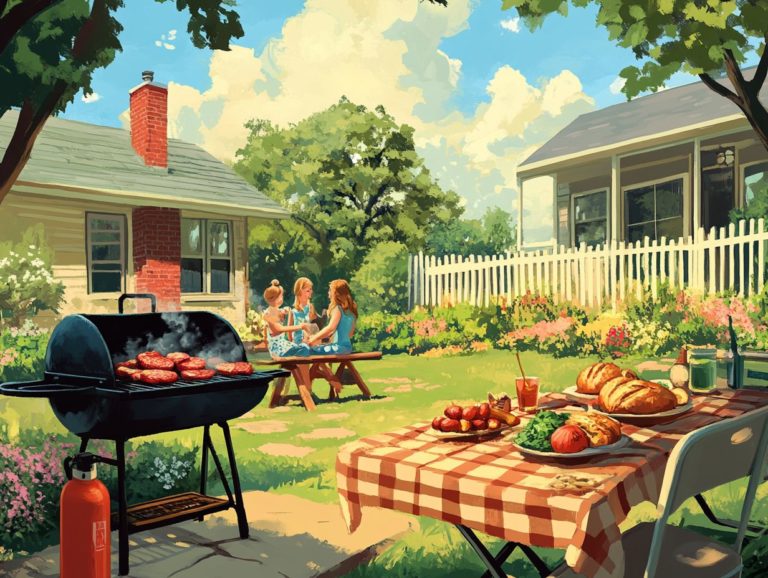Preparing for Emergencies While Cooking Outdoors
Cooking outdoors can be a delightful experience, but it comes with its own set of challenges and risks you should be aware of.
Understanding how to prepare for emergencies can be the crucial factor that turns a fun outing into a stressful situation. This article explores common emergencies that may arise while cooking outdoors, identifies potential risks, and highlights essential supplies you should have on hand.
You ll also find a step-by-step guide for managing emergencies effectively, along with preventative measures to ensure your outdoor cooking remains safe and enjoyable. Get ready to cook with confidence!
Contents
- Key Takeaways:
- Common Emergencies While Cooking Outdoors
- Essential Items for Emergency Preparedness
- Emergency Procedures for Outdoor Cooking
- Preventative Measures for Outdoor Cooking Emergencies
- Frequently Asked Questions
- What should I do if I encounter an emergency while cooking outdoors?
- What supplies should I keep on hand for emergencies while cooking outdoors?
- How can I prevent emergencies while cooking outdoors?
- What should I do if someone gets injured while cooking outdoors?
- What are some common emergencies that can occur while cooking outdoors?
- How can I prepare for emergencies while cooking outdoors with children?
Key Takeaways:
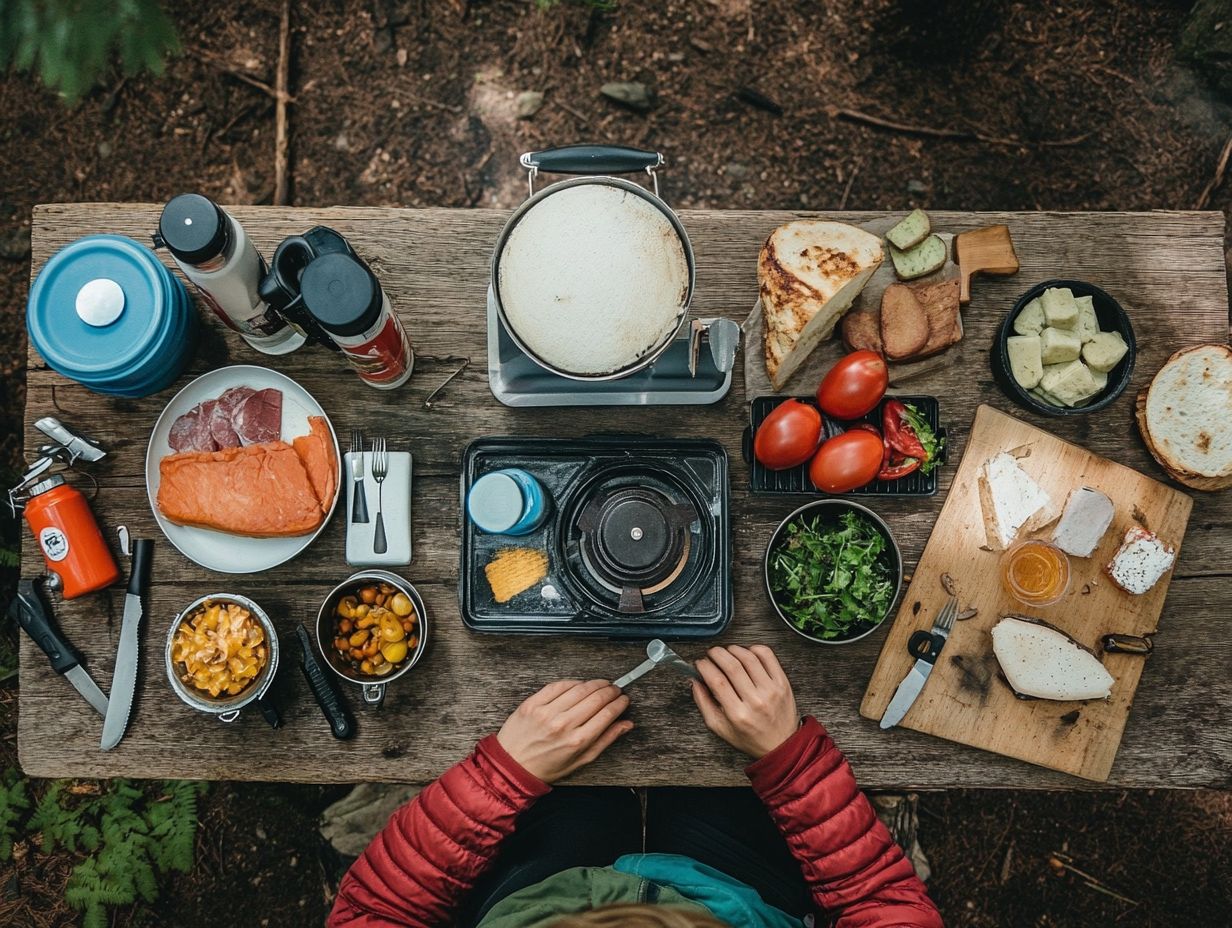
- Always be prepared for emergencies while cooking outdoors. Identify potential risks and have essential supplies and equipment on hand.
- Follow a step-by-step guide for handling emergencies and take preventative measures to avoid them in the first place.
- Preparation is your secret weapon for outdoor cooking success! Don t underestimate its importance.
Why Preparation is Important
Preparation is essential for outdoor cooking, especially with the unexpected surprises that can arise during camping or culinary adventures. By creating an effective emergency plan, you ensure that your cooking methods remain safe and efficient. For instance, consider following tips for safe outdoor cooking in windy conditions, allowing you to savor delightful meals without the worry of unforeseen complications.
Being prepared means understanding safety concerns, gathering essential cooking supplies, and curating a thoughtful food stockpile all of which contribute to a successful outdoor cooking experience.
The importance of preparation can t be overstated; it often dictates the overall success of your outdoor culinary endeavors. In emergency situations, having a reliable cooking setup and the right tools streamlines meal preparation and enhances your safety.
Key strategies include:
- Familiarizing yourself with the terrain and potential hazards.
- Creating accessible storage for your cooking supplies.
- Knowing safe alternative cooking methods, like using a portable stove or campfire.
Always keep essential items such as sturdy cookware, fire-starting materials, and first aid kits at your fingertips. This way, you’ll be ready to tackle any surprise that comes your way!
Common Emergencies While Cooking Outdoors
When cooking outdoors, common emergencies include gas leaks from portable stoves, fuel accidents, and the risk of carbon monoxide poisoning, which is a dangerous gas produced by burning fuels, especially in enclosed spaces. Familiarizing yourself with the top risks of outdoor cooking and how to avoid them can help ensure a safer experience.
Recognizing these potential hazards is vital for ensuring a safe outdoor cooking experience and should be woven into your emergency plan, especially when considering staying safe while cooking in remote locations.
Identifying Potential Risks
Actively identifying risks is an essential step in ensuring the safety of your outdoor cooking adventures. This proactive approach keeps you safe and can prevent emergencies. Consider environmental factors such as weather conditions, the use of flammable materials, and the proximity of your cooking area to combustible structures.
By assessing these elements ahead of time, you significantly enhance your overall preparedness, creating a safer cooking experience.
Equipment-related dangers, like malfunctioning grills or improperly handled sharp tools, can present serious threats. Ensuring that all your equipment is in good working order and adhering to safety guidelines can dramatically reduce the likelihood of accidents.
Be aware of local wildlife interactions and choose a suitable cooking location to further protect against unexpected hazards. By thoroughly evaluating these components, you can enjoy your culinary adventures while fostering a culture of awareness and responsibility.
Essential Items for Emergency Preparedness
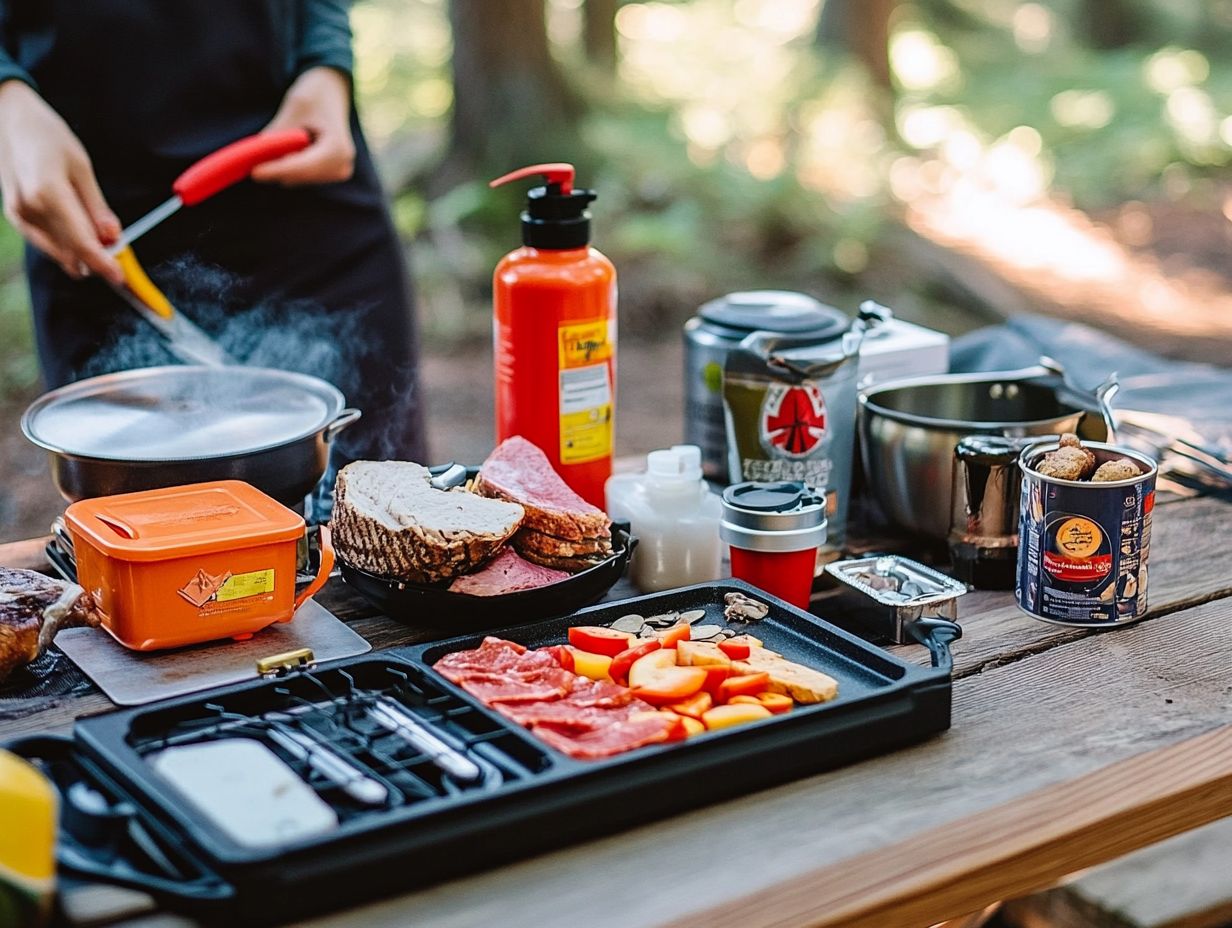
Preparing for emergencies while cooking outdoors calls for a thoughtfully curated collection of essential items to tackle various situations effectively. Additionally, consider following tips for cooking with kids outdoors safely. Key items in your arsenal should include:
- emergency food supplies,
- dependable cooking equipment like portable wood stoves and emergency stoves,
- essential safety tools such as fire extinguishers.
Knowing safety regulations keeps your cooking area compliant and makes your outdoor cooking experience better, allowing you to focus on enjoying the moment.
Must-Have Supplies and Equipment
Having the right supplies and equipment is absolutely essential for mastering outdoor cooking and being prepared for emergencies. Ensure you have must-have items like cooking thermometers to guarantee food safety and portable wood stoves for efficient cooking.
Reliable emergency stoves can elevate your cooking experience, especially when traditional fuels are nowhere in sight. Durable, non-stick cookware makes meal prep easy. High-quality cutting boards and knives speed up food preparation.
Don t overlook the importance of a well-stocked first-aid kit for managing any minor injuries that may arise while cooking outdoors. Essential utensils like spatulas, tongs, and ladles enhance your efficiency when juggling multiple tasks.
By planning ahead and investing in these essential supplies, you can ensure your outdoor meals are not just delicious but also safe and enjoyable, no matter the circumstances.
Emergency Procedures for Outdoor Cooking
Follow these emergency procedures to stay safe while cooking outdoors! Establish a safe cooking area now to prevent fires. Additionally, it’s important to know what to do in case of an outdoor cooking accident, familiarize yourself with emergency cooking methods, and understand the critical fire safety rules.
By following these guidelines, you can cultivate a safer cooking environment and be well-prepared to tackle any challenges that may come your way.
Step-by-Step Guide for Handling Emergencies
A step-by-step guide for handling emergencies while cooking outdoors is essential for your safety and for ensuring that you can respond swiftly to unexpected situations. This guide should outline procedures for common emergencies, from identifying safety concerns to employing appropriate cooking methods when equipment fails or fire hazards arise. Additionally, following safety tips for cooking with open flames outdoors can further enhance your preparedness.
Plus, this guide provides crucial insights on managing mishaps like flare-ups or misplaced utensils. It will underscore the importance of preparation before you embark on your outdoor cooking adventure.
By proactively assembling a first-aid kit, keeping a fire extinguisher within reach, and familiarizing yourself with local wildlife hazards, you can significantly reduce risks. Incorporating tips for effective communication with fellow outdoor chefs and establishing designated cooking zones will enhance the camaraderie of the experience.
Ensure that you all enjoy a delightful culinary journey while remaining safe and vigilant.
Preventative Measures for Outdoor Cooking Emergencies
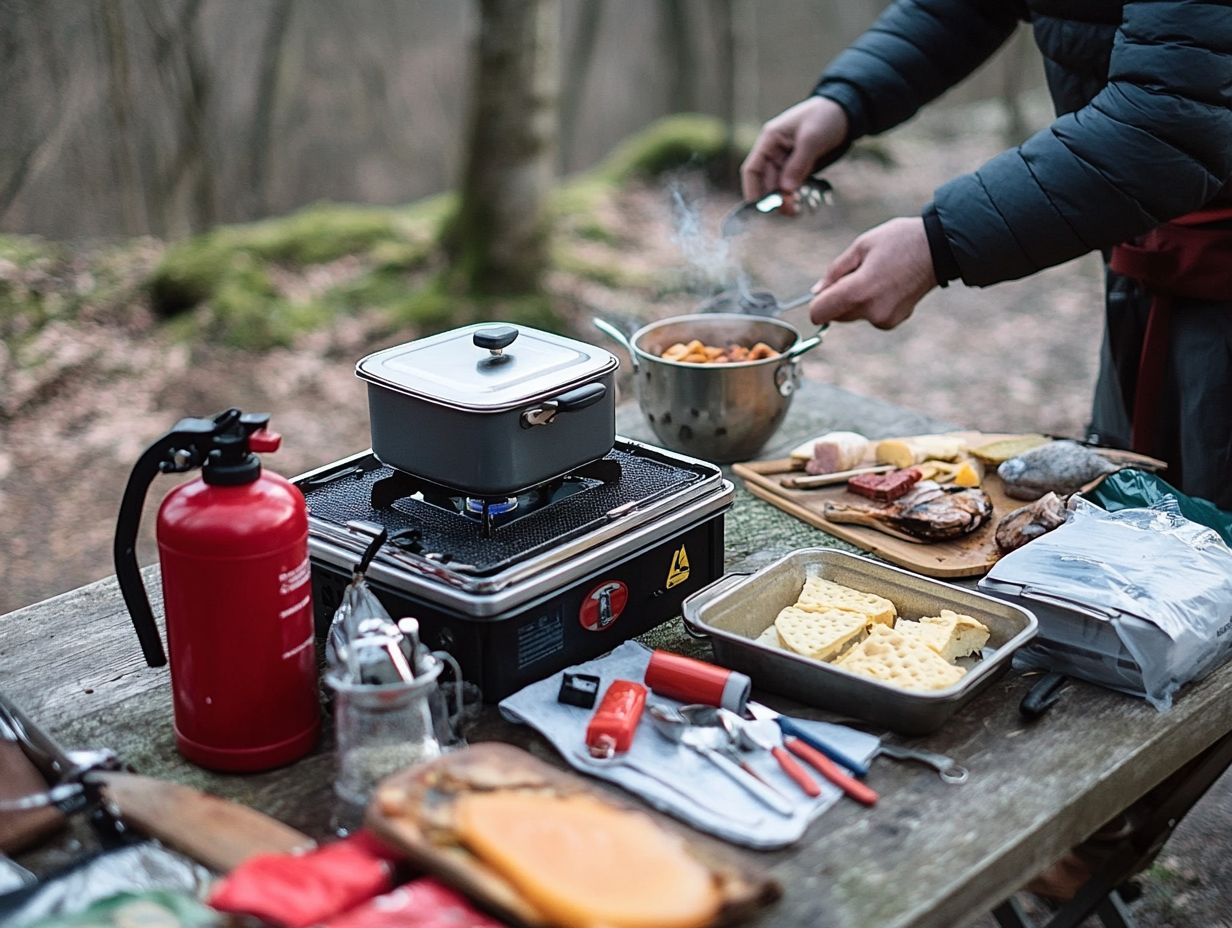
Implementing preventative measures is essential for elevating your outdoor cooking experience and minimizing the risk of emergencies. By adopting cooking safety practices like storing fuel properly, utilizing designated fire pits, and opting for no-cook meals when the situation calls for it you can effectively mitigate risks.
Start preparing your emergency cooking kit today to stay safe and enjoy your outdoor adventures!
Tips for Avoiding Emergencies
To elevate your outdoor cooking experience and reduce the risk of emergencies, it’s crucial to embrace specific tips focused on safety and preparedness. This includes selecting an appropriate cooking area and becoming familiar with different cooking methods.
Understanding fire safety precautions is essential to prevent accidents. When setting up your outdoor cooking space, opt for a flat, stable surface that s clear of overhanging branches and flammable materials. This thoughtful choice is key to preventing mishaps.
Utilizing proper cooking methods, like a grill or camp stove instead of open flames, further helps to mitigate risks. Familiarize yourself with local safety regulations regarding outdoor cooking to ensure compliance and enhance your safety measures.
Always have a fire extinguisher or a bucket of water on hand. Educate your companions about safety practices. By following the top outdoor cooking safety tips for beginners, you can fully enjoy your outdoor culinary adventures while minimizing the chances of emergencies.
Importance of Being Prepared for Emergencies
Being prepared for emergencies is vital! It can dramatically enhance your outdoor cooking adventures, influencing both your safety and the overall quality of your culinary experience. Adequate emergency preparedness means ensuring you have the essential cooking supplies, including outdoor cooking equipment like camping stoves and portable wood stoves.
Familiarize yourself with various cooking methods suited to different situations, such as foil dinners and no-cook meals. Maintain a strong grasp of cooking safety protocols.
When you embark on outdoor culinary adventures, unexpected challenges can emerge. Basic supplies, like a dependable portable stove, fire-starting kits, and non-perishable food items, should always be readily available.
Additionally, having emergency food supplies such as Meals Ready to Eat (MREs) can be beneficial. Understanding cooking techniques, such as baking in a solar oven, conserves fuel and enhances safety. Grilling over an open fire or using designated fire pits also minimizes safety concerns.
By adopting these measures, you not only foster an enjoyable atmosphere but also create a safer environment for food preparation. This allows everyone to relish the experience without unnecessary risks, particularly those associated with flammable fuels like propane and kerosene.
Frequently Asked Questions
What should I do if I encounter an emergency while cooking outdoors?
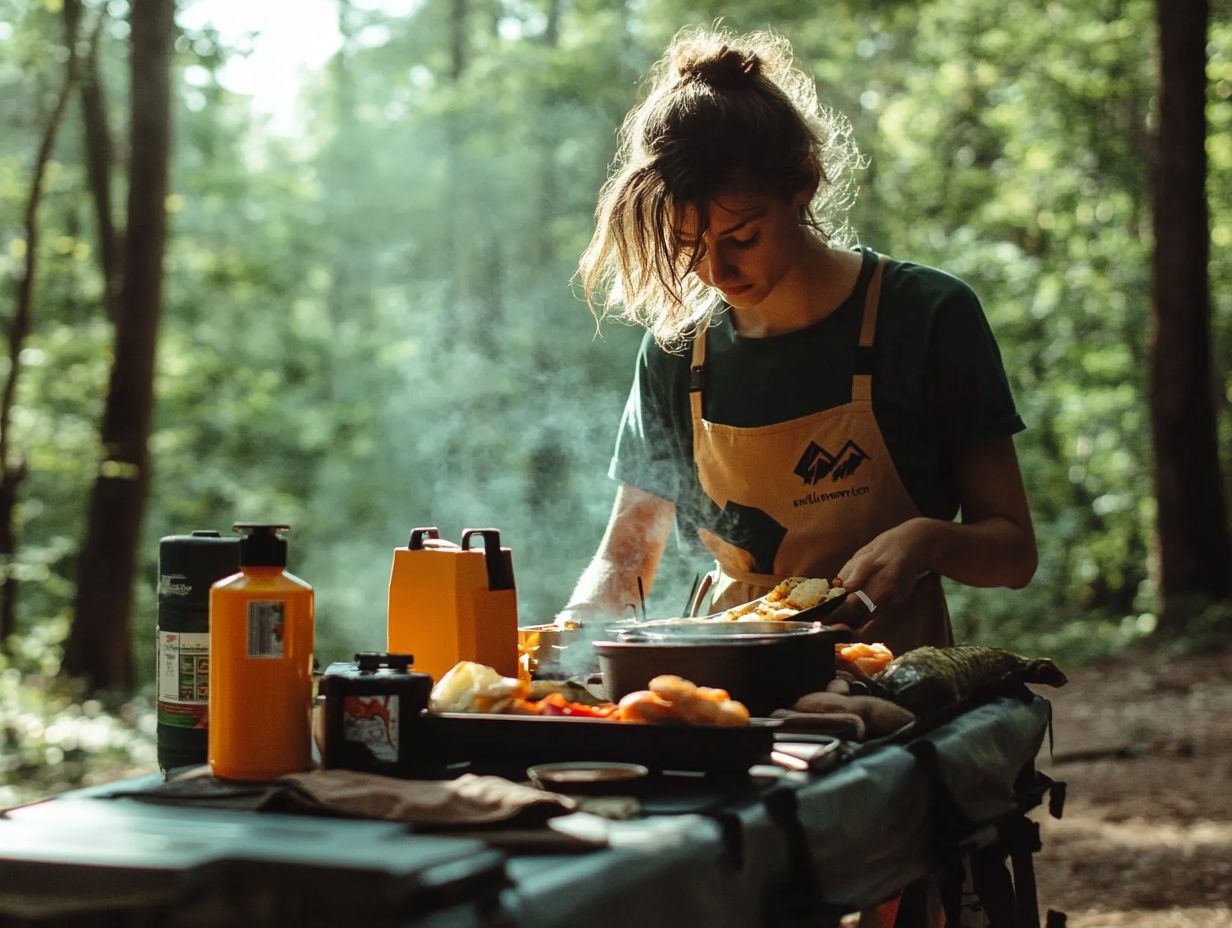
If you encounter an emergency while cooking outdoors, remain calm and assess the situation. Call for help if needed. Additionally, following safety tips for cooking on a budget outdoors can help you safely put out any fires if you can and move away from potential hazards.
What supplies should I keep on hand for emergencies while cooking outdoors?
It’s important to have a well-stocked first aid kit, cooking thermometers to ensure food safety, a fire extinguisher, and a fully charged cell phone. Keep a supply of water and non-perishable food, as these can be vital during extended emergencies.
How can I prevent emergencies while cooking outdoors?
The best way to prevent emergencies is to be prepared. Ensure you have all necessary supplies and equipment, and always follow safety precautions when using open flames or cooking with heat.
Pay attention to weather conditions and avoid cooking during extreme weather. Always be cautious about potential gas leaks.
What should I do if someone gets injured while cooking outdoors?
If someone gets injured while cooking outdoors, first assess how serious the injury is. If it’s minor, provide first aid if you can.
If the injury is serious, call for medical help immediately. If possible, move the injured person to a safe location while waiting for assistance.
What are some common emergencies that can occur while cooking outdoors?
Common emergencies while cooking outdoors include burns, cuts, food poisoning, and fires. These risks can be heightened by not storing fuel properly, as highlighted in the dangers of cooking outdoors without supervision.
Be aware of these risks and know how to handle them. Understand the dangers of carbon monoxide when using certain cooking appliances.
How can I prepare for emergencies while cooking outdoors with children?
Cooking outdoors with kids can be fun, but preparation is key. Always supervise children and follow safety precautions.
Have a designated adult responsible for emergencies, especially when camping. Teaching children about fire safety and basic first aid is also important.

